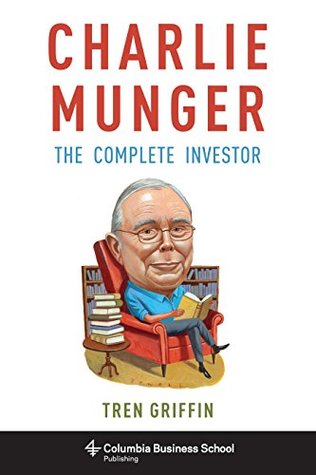More on this book
Community
Kindle Notes & Highlights
by
Tren Griffin
Read between
January 6 - February 9, 2020
A lattice approach is, in effect, a double-check on the investing process. But instead of just two checks, you are checking the result over and over. Munger believes that by going over your decision-making process and carefully using skills, ideas, and models from many disciplines, you can more consistently not be stupid.
Terribly smart people make totally bonkers mistakes. —CHARLIE MUNGER, USC BUSINESS SCHOOL, 1994
Take the probability of loss times the amount of possible loss from the probability of gain times the amount of possible gain. That is what we’re trying to do. It’s imperfect, but that’s what it’s all about. —WARREN BUFFETT, BERKSHIRE ANNUAL MEETING, 1989
Reward and Punishment Superresponse Tendency
I think I’ve been in the top 5 percent of my age cohort almost all my adult life in understanding the power of incentives, and yet I’ve always underestimated that power. Never a year passes but I get some surprise that pushes a little further my appreciation of incentive superpower.
An example of a really responsible system is the system the Romans used when they built an arch. The guy who created the arch stood under it as the scaffolding was removed. It’s like packing your own parachute. —CHARLIE MUNGER, BERKSHIRE ANNUAL MEETING, 1993
2. Liking/Loving Tendency
Munger likes to say that a year in which you do not change your mind on some big idea that is important to you is a wasted year.
3. Disliking/Hating Tendency
The skill needed to sort out whether a person is genuine is acquired with experience—the cause of good judgment is usually experiences involving bad judgment.
4. Doubt-Avoidance Tendency
Daniel Kahneman considers doubt-avoidance tendency to be a System 1 activity, which Michael Mauboussin described as follows: “System 1 is your experiential system. It’s fast. It’s quick. It’s automatic and really difficult to control. System 2 is your analytical system: slow, purposeful, deliberate, but malleable.”5
5. Inconsistency-Avoidance Tendency
Mark Twain’s statement comes to mind on this tendency: “All you need in this life is ignorance and confidence; then success is sure.”7
Curiosity Tendency
Striking the right balance on something like curiosity requires judgment.
Kantian Fairness Tendency
some people would rather lose money in an investment than see another person benefit from unfairness.
Munger points to such a rule in the U.S. Navy which dictates that your career is over if you make a big mistake (e.g., if your ship goes aground) even if it was not your fault. Munger believes that the rule is good for society because it creates incentives for the naval officer to make sure that this does not happen, even though it may not be fair to the individual.
8. Envy/Jealousy Tendency
The idea of caring that someone is making money faster [than you] is one of the deadly sins. Envy is a really stupid sin because it’s the only one you could never possibly have any fun at. There’s a lot of pain and no fun. Why would you want to get on that trolley? —CHARLIE MUNGER, WESCO ANNUAL MEETING, 2003
“It’s not greed that drives the world, but envy.”
Munger’s point on envy is simple: nothing good comes from envy. He believes that envy is a completely wasted emotion that a person should work hard to avoid.
Just saying no to envy is the best approach.
9. Reciprocation Tendency
The urge to reciprocate favors and disfavors is so strong that even someone smiling at you is hard not to reciprocate.
In other words, the desire to reciprocate often results in an unequal exchange of value.
10. Influence-from-Mere-Association Tendency
Unfortunately, people can be misled by mere association too easily, and that can lead to investing errors.
compliance professionals know this human weakness, advertisers spend huge amounts of money to associate their products and services with favorable images.
There is significant danger inherent in this syndrome because people, often executives or politicians, may surround themselves with people who only tell them what they want to hear.
11. Simple, Pain-Avoiding Psychological Denial
Failure to handle psychological denial is a common way for people to go broke.
Nobel Prize-winning psychologist Daniel Kahneman believes that “[people do not invest even] the smallest amount trying to actually figure out what they’ve done wrong—not an accident: they don’t want to know.”
Daniel Kahneman pointed this out: “It’s all too easy to tell stories that make sense of one’s life in retrospect.”
12. Excessive Self-regard Tendency
“Confidence is a feeling, one determined mostly by the coherence of the story and by the ease with which it comes to mind, even when the evidence for the story is sparse and unreliable. The bias toward coherence favors overconfidence. An individual who expresses high confidence probably has a good story, which may or may not be true.”
13. Over-Optimism Tendency
In the 4th century B.C., Demosthenes noted that “what a man wishes, he will believe.” And in self-appraisals of prospects and talents it’s the norm, as Demosthenes predicted, for people to be ridiculously over-optimistic. —CHARLIE MUNGER, PHILANTHROPY, 1999
If someone who has spent his life studying dysfunctional decision-making falls prey to the same problems he studies (e.g., overoptimism), these tendencies are indeed strong.
14. Deprival Super-Reaction Tendency
The deprival super-reaction tendency is more commonly called loss aversion, and it can cause investors to irrationally avoid risk when they face potential for gain, but irrationally seek risk when there is a potential for loss.
people tend to be too conservative in seeking gains and too aggressive in seeking to avoid losses.
The empirical evidence suggests we feel losses about two to two-and-a-half times more than we feel gains.
15. Social-Proof Tendency
good ideas cause more investment mischief than bad ideas.
“One means we use to determine what is correct is to find out what other people think is correct. We view a behavior as more correct … to the degree we see others performing it.”


